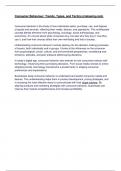Consumer Behaviour: Trends, Types, and Tactics (nielseniq.com)
Consumer behavior is the study of how individuals select, purchase, use, and dispose
of goods and services, reflecting their needs, desires, and aspirations. This multifaceted
concept blends elements from psychology, sociology, social anthropology, and
economics. It’s not just about what consumers buy, but also why they buy it, how they
use it, and how their choices affect their own well-being and that of society.
Understanding consumer behavior involves delving into the decision-making processes
of buyers, both individually and in groups. It looks at the influences on the consumer
from psychological, social, cultural, and environmental perspectives, considering how
emotions, attitudes, and peer pressure affect buying decisions.
In today’s digital age, consumer behavior also extends to how consumers interact with
technology, influencing their purchasing decisions. From social media reviews to online
shopping trends, technology has become a pivotal factor in shaping consumer
preferences and expectations.
Businesses study consumer behavior to understand and predict consumer needs and
desires. This understanding helps them in product development, pricing strategies, and
in choosing the most effective ways to communicate with their target markets. By
aligning products and marketing strategies with consumer behavior, businesses can
improve their market competitiveness and increase profitability.
,Consumer and shopper insights
Understand consumer and shopper behavior, demographics, and loyalty with NielsenIQs
solutions: modern, representative consumer panels and customer survey capabilities.
Learn More
Why is Consumer Behaviour Important?
Understanding consumer behavior is crucial for companies across various sectors, as it
directly impacts marketing strategies, sales, and customer retention. By comprehending
how and why consumers make their purchasing decisions, businesses can tailor their
products and services to better meet the needs and desires of their target audience.
This understanding leads to more effective marketing and communication strategies,
ensuring that messaging resonates with consumers and stimulates engagement. It also
, aids in developing customer loyalty programs that effectively retain customers by
aligning with their buying habits and preferences.
Moreover, insights into consumer behavior assist in inventory management, ensuring
that products in demand are readily available, thereby reducing waste and increasing
efficiency. This knowledge also enables companies to anticipate market trends, adapt to
changing consumer needs, and stay ahead of competitors.
In essence, understanding consumer behavior is not just about selling products; it’s
about creating a brand experience that aligns with consumer lifestyles and values. This
alignment not only increases sales but also builds a loyal customer base that is key to
long-term business success.
Better Marketing and Communications
Effective marketing hinges on understanding consumer behavior. By analyzing how
consumers make purchasing decisions, companies can create targeted marketing
campaigns that resonate more deeply with their audience. This leads to higher
engagement, improved brand loyalty, and ultimately, increased sales. Tailored
marketing messages based on consumer behavior insights ensure that the right
message reaches the right audience at the right time, maximizing the impact of
marketing efforts.
Increase Customer Loyalty
Understanding consumer behavior is key to building customer loyalty. By recognizing
and responding to consumer preferences and values, companies can create
personalized experiences and products that foster a deeper emotional connection with
their customers. This connection encourages repeat business and word-of-mouth
referrals, which are invaluable for long-term business growth. Loyal customers are more
likely to make repeat purchases and are often less sensitive to price changes, making
them a crucial asset for any business.
Better Plan Inventory
Insights into consumer behavior enable businesses to forecast demand more accurately,
leading to smarter inventory planning. By understanding purchasing trends, companies
can stock products that are more likely to sell, reducing the costs associated with
overstocking and stock-outs. This efficient inventory management not only cuts down on
waste but also ensures that customers find what they need when they need it,
enhancing overall customer satisfaction and loyalty.




